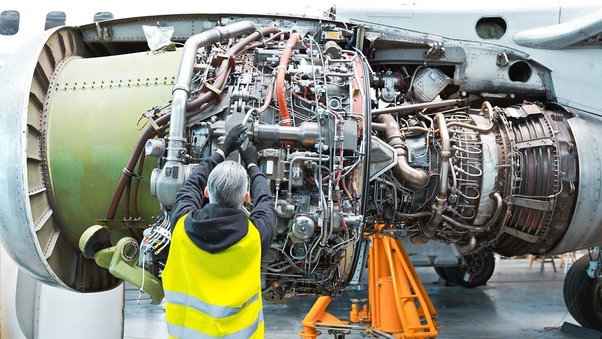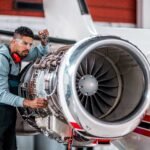Aviation Degree vs. Aviation Technician Training
Choosing a career in aviation presents a range of options, each leading to unique opportunities and challenges. For many aspiring professionals, the decision between pursuing an aviation degree and aviation technician training is a pivotal one. This article provides an in-depth comparison of these two paths, helping you make an informed decision based on your career goals, interests, and the demands of the industry.

Understanding an Aviation Degree
An aviation degree typically involves a comprehensive program that covers various aspects of aviation beyond the technical skills. Students gain a broader understanding of aviation laws, management, operations, and safety systems. Programs may vary from general aviation studies to specialized degrees in aviation management or aeronautical science.
Advantages of an Aviation Degree
- Broader Career Opportunities: Graduates can pursue careers in flight operations, aviation management, air traffic control, and even roles in aviation policy and education.
- Higher Earning Potential: With a degree, you’re often qualified for higher-level positions that command better salaries.
- Strong Theoretical Foundation: The extensive coursework helps in understanding complex aviation systems and technologies.
Challenges of an Aviation Degree
- Time and Financial Investment: Earning a degree requires a significant investment of time, typically four years, and often comes with higher education costs.
- Competitive Field: Entry into aviation degree programs can be competitive, and there’s no direct path to becoming a pilot if that is the goal.
Exploring Aviation Technician Training
Aviation technician training focuses primarily on the maintenance and repair of aircraft. This training is more technical and hands-on, preparing students for immediate operational roles within the industry.
Advantages of Aviation Technician Training
- Shorter Duration: Most programs can be completed in about two years, allowing graduates to enter the workforce sooner.
- Practical Skills: The curriculum is designed around gaining practical skills in real-world environments.
- Certification Preparedness: Completes preparation for FAA certification exams, which are necessary for all aircraft technicians.
Challenges of Aviation Technician Training
- Physically Demanding: The job often requires physical work, which can be challenging for some.
- Narrower Focus: Specialization means fewer career shifts within the field of aviation. If you want to transition to other areas of aviation, further training might be necessary.
Job Market and Industry Demand
The aviation industry continues to grow, with increasing air travel and advancements in aircraft technology creating more opportunities. According to industry forecasts, the demand for both aviation professionals and technicians is expected to rise.
- For Aviation Degree Holders: There is a growing need for skilled managers and operators to handle complex operations as the global aviation marketplace expands.
- For Aviation Technicians: The Bureau of Labor Statistics projects a steady demand for aviation technicians as older aircraft require more maintenance and new models require specialized service.
Choosing the Right Path
Your decision should depend on your career objectives, the lifestyle you envision, and your educational preferences. If you prefer a more hands-on approach and quicker entry into the workforce, aviation technician training might be suitable. However, if you’re interested in a broader range of career options and advancing into leadership roles, an aviation degree could be the better choice.
Further Education and Advancement
Both paths offer opportunities for further education and advancement. Technicians can pursue additional certifications or specialize in specific types of aircraft, while degree holders might continue to postgraduate studies or obtain additional licenses for expanded career options

Sure, let’s compare the depth of knowledge and skills acquired in an Aviation Degree program versus Aviation Technician Training:
- Aviation Degree:
- Depth of Knowledge: Aviation degree programs typically offer a broad and comprehensive understanding of various aspects of aviation, including theory, regulations, management, safety, and technology.
- Theoretical Foundation: Students learn about aerodynamics, aircraft systems, aviation law, air traffic control, aviation management, and other related subjects.
- Hands-on Experience: While aviation degree programs may include practical components such as flight training or simulator sessions, the emphasis is often more on theoretical understanding and preparing students for roles such as pilots, aviation managers, air traffic controllers, or aviation researchers.
- Career Pathways: Graduates of aviation degree programs often pursue careers as commercial pilots, aviation managers, aviation safety inspectors, airport managers, or in other aviation-related fields requiring a deeper understanding of aviation principles and theory.
- Aviation Technician Training:
- Depth of Knowledge: Aviation technician training programs focus on developing specific technical skills related to aircraft maintenance, repair, and inspection.
- Technical Skills: Students learn how to troubleshoot, repair, and maintain various aircraft systems and components, including engines, avionics, airframes, and hydraulic systems.
- Hands-on Experience: The emphasis in aviation technician training is on practical, hands-on experience working with actual aircraft or simulators under the supervision of experienced instructors.
- Certifications: Graduates of aviation technician training programs often earn certifications from aviation regulatory authorities, such as the FAA (Federal Aviation Administration) in the United States, which qualify them to work as aircraft mechanics or technicians.
- Career Pathways: Graduates typically find employment as aircraft mechanics, avionics technicians, maintenance technicians, or other roles within the aviation maintenance industry.
Comparison:
- Depth vs. Breadth: Aviation degree programs offer a broader understanding of aviation principles and theory, while aviation technician training programs provide deeper, more specialized knowledge and skills in aircraft maintenance and repair.
- Career Focus: Aviation degree programs may lead to a wider range of career opportunities in aviation management, piloting, or research, while aviation technician training programs are more focused on preparing students for careers in aircraft maintenance and repair.
- Practical Experience: Both programs include practical components, but the balance between theory and hands-on experience may vary. Aviation technician training typically emphasizes hands-on experience and technical skills development to a greater extent than aviation degree programs.
Frequently Asked Questions (FAQ)
1. What is the difference between an Aviation Degree and Aviation Technician Training?
- An Aviation Degree provides a comprehensive understanding of the aviation industry including piloting, management, and air traffic control, focusing more on theory and broad knowledge. Aviation Technician Training, on the other hand, focuses specifically on the technical skills required for aircraft maintenance and repair, with a strong emphasis on hands-on experience.
2. Who should pursue an Aviation Degree?
- Individuals interested in a broad range of careers in the aviation industry, including becoming commercial pilots, air traffic controllers, airport managers, or aviation researchers, should consider pursuing an Aviation Degree.
3. Who should pursue Aviation Technician Training?
- Those looking to specialize in the technical aspects of aviation, such as aircraft maintenance, repair, and the operation of aviation equipment, should consider Aviation Technician Training. This is ideal for people who enjoy hands-on work and have a strong interest in the mechanics of aviation.
4. What are the prerequisites for enrolling in an Aviation Degree program?
- Prerequisites can vary by institution but generally include a high school diploma or equivalent. Some programs might require previous coursework in subjects such as mathematics or physics, or even a pilot’s license, depending on the focus of the program.
5. What certifications are required to become an aviation technician?
- Most countries require aviation technicians to obtain specific certifications to work in the field. In the U.S., for example, the Federal Aviation Administration (FAA) offers the Airframe and Powerplant (A&P) certification which is widely recognized and often required by employers.
6. How long does it take to complete Aviation Technician Training?
- The duration can vary, but most programs take between 18 to 24 months to complete. This includes both classroom learning and hands-on training.
7. Are there any online options for pursuing these aviation studies?
- Some aspects of Aviation Degrees may be offered online, especially theoretical coursework. However, practical components and certain specialized trainings like Aviation Technician Training generally require in-person attendance to gain hands-on experience.
8. What is the average cost of these programs?
- Costs vary significantly based on the institution and geographic location. Aviation Degrees can be more expensive due to the length of study and the cost of flight training if included. Technician training programs might be less expensive, but also require investment in tools and equipment.
9. What kind of jobs can I get with an Aviation Degree?
- Graduates can pursue careers as pilots, aviation managers, air traffic controllers, aviation consultants, and more, depending on their areas of focus and interest within the program.
10. What are the job prospects for aviation technicians?
- Job prospects are generally good due to ongoing demand for aircraft maintenance and repair. Technicians can work in a variety of settings including airlines, private aviation companies, and government agencies.


